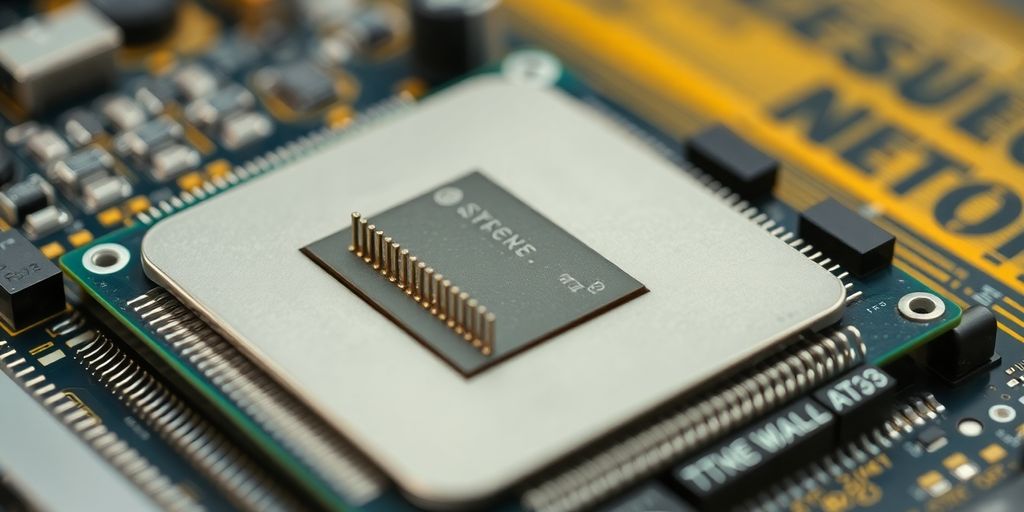Buying a refurbished computer can be a smart choice for those looking to save money while still getting a reliable machine. Understanding the specifications, especially the CPU, is key to making an informed decision. This guide will help you navigate the essential aspects of CPU specs in refurbished computers, ensuring you find the right fit for your needs.
Key Takeaways
- Refurbished computers are pre-owned devices that have been restored to meet quality standards.
- The CPU is crucial for performance; choose between Intel and AMD based on your needs.
- Understanding CPU generations helps in selecting a machine that balances performance and efficiency.
- Key specs like core count, clock speed, and cache memory significantly impact how well a computer performs.
- Upgrading a refurbished computer is often possible, making it a flexible option for future needs.
What Are Refurbished Computers?

Refurbished computers are pre-owned devices that have been carefully inspected and restored to a condition that meets or even exceeds the original specifications. This process not only makes them a cost-effective option but also helps reduce electronic waste, making them an environmentally friendly choice.
Understanding the Basics
When you hear the term “refurbished computers,” think of them as a second chance for devices that might have been returned or used before. They go through a thorough refurbishment process, which includes:
- Inspection: Each device is checked for any issues.
- Repair: Any problems found are fixed.
- Testing: The computer is tested to ensure it works properly.
- Cleaning: The device is cleaned to look as good as new.
Key Differences from New Computers
Refurbished computers differ from new ones in several ways:
- Price: They are usually much cheaper than brand-new models.
- Condition: While they are restored, they may show minor signs of use.
- Warranty: Many refurbished computers come with a warranty, providing peace of mind.
Benefits of Choosing Refurbished
Opting for refurbished computers can be a smart choice for many reasons:
- Cost Savings: You can save a significant amount compared to buying new.
- Quality Assurance: Many refurbished devices are certified and come with warranties.
- Eco-Friendly: Buying refurbished helps reduce electronic waste and promotes recycling.
Refurbished laptops, desktop computers, and even computer monitors can be great options for those looking to save money while still getting reliable technology.
In summary, refurbished computers offer a fantastic way to get quality devices at a fraction of the cost, making them a popular choice for budget-conscious consumers.
The Importance of CPU in Refurbished Computers

When it comes to refurbished computers, the CPU (Central Processing Unit) plays a crucial role in determining how well the computer performs. It’s like the brain of the computer, handling all the tasks and calculations. Here’s why understanding the CPU is so important:
What is a CPU?
A CPU is a small chip that processes instructions from programs and applications. It’s responsible for executing commands and performing calculations. In refurbished computers, you’ll often find CPUs from well-known brands like Intel and AMD, each offering different models and capabilities.
How CPU Affects Performance
The performance of a refurbished computer largely depends on its CPU. Here are some key factors:
- Core Count: More cores can handle more tasks simultaneously, which is great for multitasking.
- Clock Speed: Measured in GHz, higher clock speeds mean faster processing.
- Cache Memory: This is a small amount of memory that helps speed up data access for frequently used information.
| Feature | Intel CPUs | AMD CPUs |
|---|---|---|
| Core Count | 2 to 16 cores | 2 to 16 cores |
| Clock Speed | 1.1 to 5.3 GHz | 2.0 to 4.9 GHz |
| Cache Memory | 3MB to 30MB | 4MB to 64MB |
Choosing the Right CPU for Your Needs
When selecting a refurbished computer, consider the following:
- Usage: What will you use the computer for? Basic tasks, gaming, or creative work?
- Budget: Higher-end CPUs can be more expensive, so find a balance that works for you.
- Future Needs: Think about whether you might need more power in the future.
Understanding the CPU is essential for making an informed decision when buying refurbished computers. It can help you find a machine that meets your needs without overspending.
In summary, the CPU is a vital component in refurbished computers, affecting everything from speed to multitasking capabilities. By knowing what to look for, you can ensure you choose a computer that fits your requirements perfectly. Whether you’re printing documents or gaming, the right CPU can make all the difference!
Intel vs. AMD: Which CPU is Better for Refurbished Computers?
Overview of Intel CPUs
When it comes to refurbished computers, Intel CPUs are often a popular choice. They are known for their strong performance in tasks that require high single-threaded speed, making them great for everyday use and light gaming. Intel’s Core series, including i3, i5, i7, and i9, offers a range of options:
- Core i3: Good for basic tasks like browsing and word processing.
- Core i5: A balanced choice for most users, suitable for multitasking.
- Core i7 and i9: Best for demanding applications like gaming and video editing.
Overview of AMD CPUs
On the other hand, AMD CPUs have gained a lot of popularity in recent years. They often provide more cores for the price, which can be beneficial for multitasking and creative work. The Ryzen series is AMD’s main offering:
- Ryzen 3: Comparable to Intel’s i3, ideal for basic computing.
- Ryzen 5: A solid choice for mainstream users, balancing performance and cost.
- Ryzen 7 and 9: Excellent for gaming and content creation, offering high performance.
Comparing Performance and Value
When comparing Intel and AMD, it’s essential to consider what you need:
| Feature | Intel CPUs | AMD CPUs |
|---|---|---|
| Single-threaded Performance | Generally better for gaming | Good, but not as strong |
| Multi-threaded Performance | Good, but fewer cores | Often more cores for the price |
| Price | Can be higher for similar performance | Usually more budget-friendly |
In summary, both Intel and AMD have their strengths. Intel tends to excel in single-threaded tasks, while AMD often offers better multi-threaded performance for the price. The choice between them depends on the user’s specific needs and budget.
Ultimately, the best CPU for a refurbished computer is the one that fits your needs and budget. Whether you choose Intel or AMD, both can provide great performance for various tasks.
Understanding CPU Generations in Refurbished Computers
What Are CPU Generations?
CPU generations refer to the different versions of processors released by manufacturers like Intel and AMD over time. Each generation typically brings improvements in performance, efficiency, and features. Understanding these generations is key when selecting a refurbished computer, as newer generations often provide better value for your money.
Impact on Performance and Efficiency
The performance and efficiency of a CPU can significantly affect how well a computer runs. Here’s how different generations impact these aspects:
- Speed: Newer generations usually have faster clock speeds, which means they can process tasks more quickly.
- Energy Efficiency: Modern CPUs are designed to consume less power, which is great for battery life in laptops.
- Features: Newer CPUs often come with advanced features like better integrated graphics and support for newer technologies.
How to Identify CPU Generations
Identifying the generation of a CPU is straightforward. Here are some tips:
- Look at the Model Number: For Intel, the first digit after the brand name indicates the generation (e.g., i5-10xxx is 10th generation).
- Check Manufacturer’s Website: Both Intel and AMD provide detailed specifications and generation information on their websites.
- Use System Information Tools: Software tools can help you identify the CPU and its generation directly from your computer.
Understanding CPU generations helps buyers make informed choices, ensuring they get the best performance for their needs.
In summary, knowing about CPU generations is essential when considering refurbished computers. It helps in making a smart purchase that balances performance and cost.
Decoding CPU Specifications in Refurbished Computers
When it comes to refurbished computers, understanding CPU specifications is key to making a smart choice. Here’s a breakdown of the important aspects:
Understanding Core Count
The core count of a CPU refers to how many processing units it has. More cores can mean better multitasking. Here’s a quick look:
| Core Count | Usage Type |
|---|---|
| 2 | Basic tasks (web browsing) |
| 4 | Everyday use (office work) |
| 6+ | Gaming and heavy applications |
The Role of Clock Speed
Clock speed is measured in gigahertz (GHz) and indicates how fast a CPU can process information. Higher speeds generally mean better performance. For example:
- 2.0 GHz: Suitable for basic tasks
- 3.0 GHz: Good for gaming and multitasking
- 4.0 GHz: Excellent for demanding applications
Importance of Cache Memory
Cache memory is a small amount of very fast memory located inside the CPU. It stores frequently used data for quick access. More cache can lead to better performance, especially in tasks that require quick data retrieval.
Understanding these specifications can help you choose a CPU that fits your needs, ensuring you get the best performance from your refurbished computer.
In summary, when decoding CPU specs, keep an eye on core count, clock speed, and cache memory. These factors will help you find a refurbished computer that meets your requirements without overspending!
How to Choose the Right CPU for Your Refurbished Computer
Choosing the right CPU for a refurbished computer can feel overwhelming, but it doesn’t have to be! Here are some simple steps to help you make the best choice:
Assessing Your Needs
- Identify your primary use: Are you gaming, working, or just browsing? This will guide your CPU choice.
- Consider multitasking: If you often run multiple applications, look for a CPU with more cores.
- Think about future needs: Will you need more power later? Opt for a slightly better CPU now to avoid upgrades soon.
Balancing Performance and Budget
- Set a budget: Determine how much you can spend on the CPU.
- Compare options: Look at both Intel and AMD CPUs to find the best value for your money.
- Check for deals: Refurbished CPUs can be a great way to save money while still getting good performance.
Future-Proofing Your Purchase
- Choose newer generations: CPUs from the latest generations often offer better performance and efficiency.
- Look for upgrade options: Ensure the motherboard can support future CPU upgrades.
- Consider energy efficiency: A more efficient CPU can save you money on electricity in the long run.
Remember, the right CPU can make a huge difference in your computer’s performance. Take your time to choose wisely!
Common Misconceptions About CPUs in Refurbished Computers

Myth: Older CPUs Are Always Worse
Many people think that older CPUs are automatically inferior. This isn’t always true! Some older models can still perform well for basic tasks like browsing the web or using office applications. It’s essential to consider the specific needs of the user rather than just the age of the CPU.
Myth: More Cores Always Mean Better Performance
Another common belief is that having more cores guarantees better performance. While having multiple cores can help with multitasking and running demanding applications, it doesn’t always translate to faster speeds for everyday tasks. For example:
- Single-core performance is crucial for many applications.
- Software optimization can make a significant difference.
- Clock speed also plays a vital role in overall performance.
Myth: Refurbished CPUs Are Unreliable
Some folks worry that refurbished CPUs are not dependable. However, many refurbished CPUs undergo rigorous testing and come with warranties. This means they can be just as reliable as new ones.
Refurbished computers can be a smart choice, offering great value without sacrificing quality.
Understanding these misconceptions can help buyers make informed decisions when choosing a refurbished computer. By focusing on the actual specifications and performance needs, users can find a CPU that fits their requirements perfectly!
The Role of CPU in Gaming and Creative Work on Refurbished Computers

CPU Requirements for Gaming
When it comes to gaming, the CPU is crucial. It handles all the calculations and processes that make games run smoothly. Here are some key points to consider:
- Core Count: More cores can help with multitasking and running demanding games.
- Clock Speed: A higher clock speed means faster processing, which is essential for gaming performance.
- Compatibility: Ensure your CPU works well with your graphics card for the best experience.
CPU Needs for Video Editing and Design
For creative work like video editing and design, the CPU plays a significant role. Here’s what to keep in mind:
- Multi-Core Performance: Programs like Adobe Premiere Pro benefit from multiple cores.
- Cache Memory: A larger cache can speed up data access, improving performance.
- Thermal Management: Good cooling solutions are necessary to maintain performance during long editing sessions.
Balancing CPU with Other Components
It’s important to balance your CPU with other parts of your computer. Here’s how:
- Graphics Card: A powerful GPU is essential for gaming and creative tasks.
- RAM: More RAM allows for better multitasking and smoother performance.
- Storage: Fast SSDs can significantly reduce load times for games and applications.
In gaming and creative work, the CPU is just one piece of the puzzle. Choosing the right combination of components is key to a great experience!
Upgrading the CPU in Your Refurbished Computer
Is It Possible to Upgrade?
Upgrading the CPU in a refurbished computer is often possible, provided your motherboard supports the new CPU’s socket type and chipset. This means that before making any decisions, it’s essential to check the compatibility of your current system. Here are some key points to consider:
- Motherboard Compatibility: Ensure that the motherboard can handle the new CPU.
- Power Supply: Check if your power supply can support the new CPU’s requirements.
- Cooling Solutions: Make sure your cooling system is adequate for the upgraded CPU.
Considerations Before Upgrading
Before diving into an upgrade, there are a few things to keep in mind:
- Cost vs. Benefit: Weigh the cost of the new CPU against the performance boost you expect.
- Skill Level: Consider whether you feel comfortable performing the upgrade yourself or if you need professional help.
- Future Needs: Think about how long you plan to use the computer and if the upgrade will meet your future needs.
Steps to Upgrade Your CPU
If you decide to go ahead with the upgrade, follow these steps:
- Research: Look up the specifications of your current CPU and the one you want to install.
- Backup Data: Always back up your important files before making hardware changes.
- Gather Tools: Make sure you have the necessary tools, like a screwdriver and thermal paste.
- Install the New CPU: Carefully remove the old CPU and install the new one, ensuring it’s seated correctly.
- Test the System: After installation, power on your computer to ensure everything is working properly.
Upgrading a CPU can breathe new life into a refurbished computer, making it a worthwhile investment for many users.
By following these guidelines, users can successfully upgrade their CPUs and enhance their computing experience!
How CPU Affects Energy Efficiency in Refurbished Computers
Understanding Power Consumption
When it comes to refurbished computers, the CPU plays a vital role in determining how much power the system uses. Different CPUs have varying power requirements, which can significantly impact energy efficiency. Here are some key points to consider:
- TDP (Thermal Design Power): This indicates how much heat a CPU generates under maximum load, which correlates with its power consumption.
- Architecture: Newer CPU architectures are often designed to be more energy-efficient, meaning they can perform better while using less power.
- Idle States: Modern CPUs can enter low-power states when not in use, reducing energy consumption significantly.
Impact on Battery Life
For laptops, the CPU’s energy efficiency directly affects battery life. A more efficient CPU can lead to longer usage times between charges. Here’s how:
- Lower Power Draw: Efficient CPUs consume less power, extending battery life.
- Heat Management: Less heat means better thermal performance, which can also help in maintaining battery health over time.
- Performance Scaling: Many CPUs can adjust their performance based on the task, saving energy when full power isn’t needed.
Choosing Energy-Efficient CPUs
When selecting a refurbished computer, consider these tips for choosing an energy-efficient CPU:
- Look for Newer Generations: CPUs from recent generations tend to be more energy-efficient.
- Check for Energy Ratings: Some CPUs come with energy efficiency ratings that can guide your choice.
- Consider Usage Needs: Match the CPU’s capabilities with your actual usage to avoid overpaying for unnecessary power.
In summary, understanding how a CPU affects energy efficiency can help buyers make informed decisions when choosing refurbished computers. A well-chosen CPU not only saves energy but also enhances overall performance.
The Future of CPUs in Refurbished Computers
As technology keeps moving forward, the future of CPUs in refurbished computers looks bright and exciting. New advancements are making these processors more efficient and powerful, which is great news for users looking for budget-friendly options.
Trends in CPU Development
- Increased Efficiency: Future CPUs are designed to use less power while delivering more performance. This means longer battery life for laptops and less energy consumption overall.
- ARM Processors: These processors utilize a streamlined set of instructions, allowing for faster processing and reduced power consumption, making them ideal for battery-operated devices.
- Integration of AI: More CPUs are starting to include AI capabilities, which can help with tasks like image recognition and voice commands, making computers smarter.
Impact of New Technologies
- Smaller Sizes: New manufacturing techniques are allowing CPUs to become smaller, which can lead to lighter and thinner computers.
- Better Cooling Solutions: As CPUs become more powerful, better cooling systems are being developed to keep them running smoothly without overheating.
- Enhanced Connectivity: Future CPUs will likely support faster internet connections, improving online experiences for users.
What to Expect in the Coming Years
- More Choices: With the rise of refurbished computers, users can expect a wider variety of CPUs available at lower prices.
- Sustainability Focus: As consumers become more eco-conscious, refurbished computers with energy-efficient CPUs will be in higher demand.
- Continued Support: Manufacturers are likely to continue supporting older CPU models, ensuring that refurbished computers remain viable options for years to come.
The future of CPUs in refurbished computers is not just about performance; it’s also about making technology accessible and sustainable for everyone.
Wrapping It Up: Your Guide to Refurbished Computers
In conclusion, understanding CPU specs and other computer parts is key when shopping for a refurbished computer. With the right knowledge, you can make smart choices that fit your needs and budget. Remember, whether you need a computer for gaming, schoolwork, or just browsing the web, there’s a refurbished option out there for you. Plus, buying refurbished is a great way to save money and help the planet by reducing e-waste. So, take your time, do your research, and soon you’ll be ready to find the perfect refurbished computer that works for you!
Frequently Asked Questions
What does refurbished mean?
A refurbished computer is a used device that has been checked, repaired, and restored to work like new. It’s not brand new, but it’s in good shape.
Are refurbished computers reliable?
Yes, refurbished computers can be very reliable. They go through a thorough inspection and repair process to make sure they work well.
Do refurbished computers come with a warranty?
Many refurbished computers do come with a warranty. This can vary, so it’s good to check the details from the seller.
Can I upgrade a refurbished computer?
Yes, you can often upgrade a refurbished computer just like a new one. It depends on the model and what parts can be changed.
Are refurbished computers good for gaming?
Refurbished computers can be good for gaming if they have the right specifications, like a strong CPU and enough RAM.
How do refurbished computers help the environment?
Buying refurbished computers helps reduce electronic waste. It gives old devices a new life instead of them ending up in landfills.
What should I look for in a refurbished computer?
Look for the condition, warranty, specifications, and the reputation of the seller. Make sure it meets your needs.
Can I trust the quality of refurbished computers?
Yes, if you buy from a reputable refurbisher, you can trust the quality. They usually have a process to ensure the computers are in good working order.








